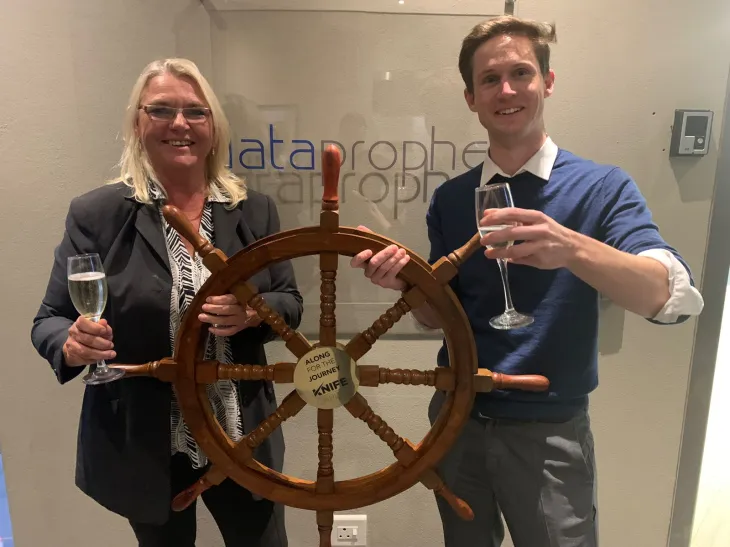DataProphet has finalised its Series A round at $10 million to help the company with its expansionist policy worldwide.
DataProphet was founded in 2014 by Frans Cronje and Daniel Schwartzkopff, who were friends at the University of Cape Town, South Africa, and decided to use their knowledge of AI technology to commence a business of their own.
The company has unlocked its full potential with the introduction of the AI-as-a-service, DataProphet PRESCRIBE, which is proposing changes to a manufacturing plant’s control plans, helping them increase their production and remove the extra costs needed to hire expert human analytics.
The funding, which started in 2020, raised its first $6 million from IDC and Norican; it has now announced the closure of the funding round as it got extra funding from Knife Capital, which invested in DataProphet as of 2018 to end it at $10 million. The funding secured is expected to provide the startup with the capital needed to further growth in selected countries and its manufacturing verticals. The company is also expected to use it to further its expansionist policy into other continents such as Asia, America, and Europe, ensuring its speedy growth.
In a statement, CEO and Co-Founder, Frans Cronje, said:
“I am excited about the continued support DataProphet has received from Knife Capital. Going forward, we will use this additional funding to accelerate and expand into new markets, build new relationships aligned with our machine builder strategy, and further our global expansion. Another important pillar is bringing in top talent to build on this momentum”.
The executive chairperson and a partner at Knife Capital, Andrea Bohmert, stated that it was astonishing that the launch of Knife Capital’s Fund II prompted it to render its support to DataProphet in its journey to be the leading provider of AI solutions, which will be very helpful to the manufacturing industry. In a statement, she said:
“The optimization of manufacturing performance in the context of smart manufacturing is still in the early adoption cycle.” The DataProphet team is world-class, as validated by the third-party recognition it received, and as such, perfectly positioned to further entrench its leadership position in this fast-growing sector”.
What is AI and its advantages?
In the year 1950, artificial intelligence (AI) was invented by John McCarthy, and he described it as a type of technology that tries to emulate the human way of life and reasoning in AI systems. In a statement, he said:
“Every aspect of learning or any other feature of intelligence can in principle be so precisely described that a machine can be made to simulate it.” An attempt will be made to to find how to make machines use language, form abstractions, and concepts, solve kinds of problems now reserved for humans, and improve themselves”.
Artificial intelligence is the capacity of a computer program, or in general, machines, to learn and think. It is here to help alleviate those problems which normally would require the intelligence of a human.
Advantages of AI technology
Human error is a term that has been associated with humans, and I don’t dispute this fact, but these errors have found a way to severely affect our lives. For example, The Covid-19 pandemic was an error by some scientists in a Chinese lab. Human errors without the introduction of AI technology would have caused more disasters in various sectors, from food- health- science, but AI technology is immune to such errors and carries out its orders perfectly as programmed into its memory. With its help, we would be confident that the decisions taken are credible and based on information gathered from applying a certain set of algorithms to ensure that they are in the best interests of all parties involved. For example, weather forecasting by humans has proven to be very unreliable and it has led to major disasters, but with AI technology, we can rest assured that unless there is a sudden turn of events, their reports are 100% credible and reliable.
There are some instances when humans would want to explore or test out new technologies which may be hazardous to their lives, such as defusing a bank or deactivating a nuclear power plant, but with the help of machines equipped with AI technology, they can take the risk for us and later get rebuilt, since if human life is lost- it is impossible to bring it back. For Example: When an explosion occurred at the Chornobyl power plant, no one would volunteer to go to the core to minimize the effect of the radiation, but if we had AI-powered robots- such risks could be taken by the machines.
There is a saying which goes thus: “Humans aren’t machines, so they need to rest.” This statement was telling employers that humans need rest after performing some tasks, but if we use machines to perform such, there will be no need for rest as special sectors such as healthcare and security would be operational 24/7. An average human would work for just 4-6 hours daily and demand rest, but these machines can work for years without needing any rest. Regular maintenance will ensure quick productivity for various businesses.
There are some repetitive jobs, such as thanking mail or signing documents for loans, which humans may consider boring and lessen their creativity, but this is the opposite for AI-powered robots, as they can do these tasks for hours without getting bored, and it even helps to improve their creativity.
AI technology is helping to perform tasks efficiently and without mistakes which improve productivity, although they might need a human to program them, they have proven that they are more efficient than humans as there is no sector where their presence isn’t felt. This also shows humans the direction the world is going and why they need to be equipped with knowledge about AI.




